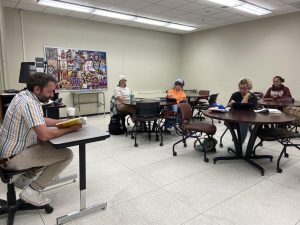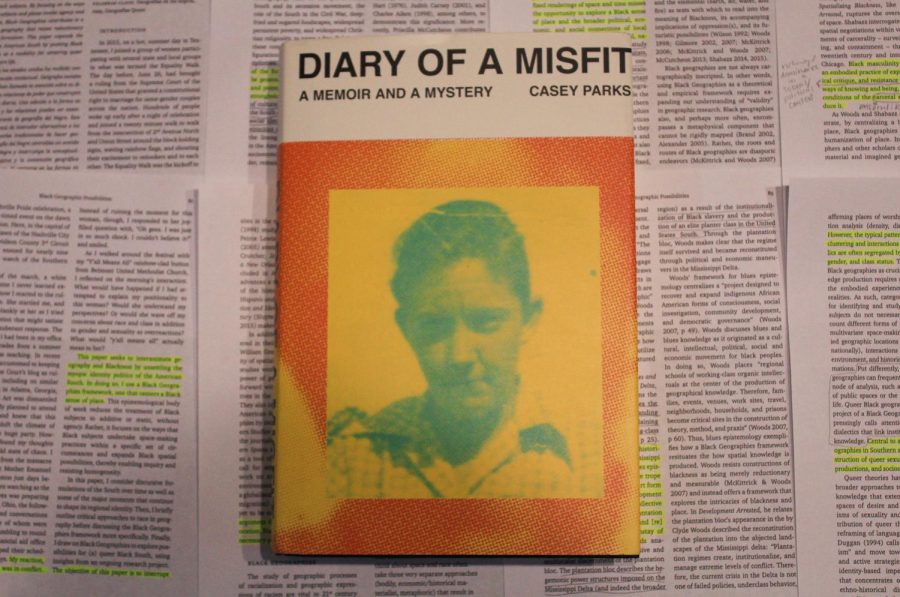LGBTQ+ Studies educates on identity, sexuality
October 17, 2022
Different experiences create different perspectives. This is why understanding other perspectives is so important, especially when learning.
Within the English Department, ULM has provided students with many classes that focus on literature created by people with unique perspectives.
Jaleesa Harris teaches African American Literature. Meredith McKinnie teaches a course that is looking into rural identities and Southern poverty. Mary Adams teaches courses that have looked at many forms of Native American literature.
But this semester, a new English class has been added to this list—giving an LGBTQ+ perspective.
School of Humanities Associate Professor Will Rogers teaches the course under the name LGBTQ+ Studies, and this year the class focuses on “The Queer South.”
While classes may have covered queer literature and texts before, this is the first class that completely focuses on queer works.
Rogers chose the topic of “The Queer South” not only to introduce students to queer theory and literature but also to bring discussion to its place in the South.
Rogers explained that the South is full of diversity, including members of the LGBTQ+ community
“It’s important that we look at their stories and the stories that queer Southern authors create,” Rogers said.

The LGBTQ community is often tossed to the side. Hearing from a group that has not always had a voice creates insight into their experiences.
Junior psychology major Mya Thornhill said that this class has benefited her by giving her a “better understanding of what being queer in the south is like.”
The class also gives students the opportunity to share their own experiences and struggles with being queer while living in the South.
“I’ve learned that discussing tough topics strengthens our own experiences of our struggles,” Thornhill said.
Reading and discussing Southern queer literature allows students to see the underlying issues that this community faces, but it also shows them they are not alone if they struggle with these issues themselves.
Rogers said that he took gay and lesbian literature as an undergraduate, and it taught him that queer works can be scholarly and worthy of analysis.
But it also showed him that he was not alone.
And now, students taking this course are realizing the same thing.
Junior English major Caley Englade said that it is easy to feel like the only queer person in Louisiana, but this class fosters a sense of community.
“After being around other students who identify as LGBTQ+ and hearing their stories and experiences, I don’t feel so alone,” Englade said.
The class has read texts by Judith Butler, Eve Sedgwick and Marlon Ross, which have led to discussions about elements of gender, sexuality and identity within queer theory.
Rogers said queer theory challenges people to rethink traditional gender binaries and go past what is “the norm.”
“What originally began as a focus on same-sex identity has grown to show how gender, for instance, is a lot more complicated than we might otherwise think,” Rogers said.
After covering queer theory, the class moved on to reading a memoir called “Diary of a Misfit” by Casey Parks.
Parks writes about the mystery revolving around Roy, a girl who dressed in boy’s clothing. Parks travels back to her hometown of Delhi, Louisiana to find out about Roy’s life.
Parks faces parts of her sexuality and her Southern identity within the novel. While reading, many students found themselves relating to Parks’ experiences, especially since the setting of the book is close by.
Englade said that reading “Diary of a Misfit” was an “amazing experience.”
“It’s rare that Louisiana is represented in LGBTQ+ media, so it was nice to read something that hits so close to home,” Englade said.
ULM giving students the chance to take a class focused on LGBTQ studies contributes to representation on campus. LGBTQ students can read and analyze literature that is made and garnered for them.
Even if you do not belong to the LGBTQ, there are plenty of reasons why you should take this course, according to Rogers.
“There’s real critical work that happens when we read about experiences which are not our own,” Rogers said. “We perhaps get to experience those things which we would never otherwise.”
Understanding experiences that do not belong to you might broaden your knowledge of other people and groups.



